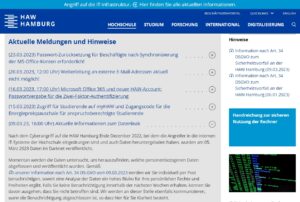
At the beginning of the year, the HAW - the Hamburg University of Applied Sciences - had major problems because the educational institution was hit by a cyber attack. In March, the updated data was evaluated and further clean-up work is still ongoing.
The Hamburg University of Applied Sciences fell victim to a large-scale ransomware attack by the APT group Vice Society earlier this year. Since the university did not pay the ransom, the IT department had to remodel a lot internally, save data and rebuild systems. The heart of the HAW's information policy has been its own website from the very beginning. There you can also read that the data leaked by the attackers was examined.
Vice Society publishes a lot of data

🔎 The HAW uses its homepage perfectly for communication after the ransomware attack (Image: B2B-CS).
The data has only been available on the Vice Society leak page since the 2nd week of March. The directly affected employees and students have been informed by the HAW. In the further course, the HAW will switch to 365-factor authentication for MS Office 2 and Outlook.
The current process at HAW clearly shows how much work a successful attack by ransomware places on those responsible. For months, the IT department has been working on rebuilding the systems with external help, as otherwise another encryption could not be ruled out. Only through these extensive measures is the restart crowned with success.
The University of Duisburg-Essen (UDE), which also fell victim to a cyber attack at the end of 2022, also had internal tasks to do for a very long time. On its website, the university informs that on March 13th it will finally be possible to return to the normal website. The work-up took the university months because it was hit by ransomware and also didn't pay a ransom.
More at HAW-Hamburg.de
